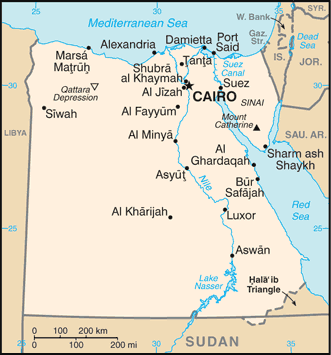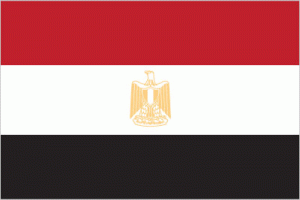Egypt
 Aglow Status: Restricted
Aglow Status: Restricted
(The term “Restricted Nation” as used in Aglow is a nation where it is difficult or dangerous to be a Christian. Therefore the status of Aglow in nations indicated as Restricted is withheld.)
Capital: Cairo
Pray:
- Pray for all the resources and creativity needed to fulfill the intentions of God in the nation of Egypt.
- Pray for godly government leaders. Blessed is the nation whose God is The Lord, the people whom He has chosen for His own inheritance. Psalm 33:12
Proclaim:
- Arise, shine; for your light has come! And the glory of the LORD is risen upon you. For behold, the darkness shall cover the earth, and deep darkness the people; but the LORD will arise over you, and His glory will be seen upon you. Isaiah 60:1,2 (NKJV)
- Lift up your heads, O you gates! Lift up, you everlasting doors! And the King of glory shall come in. Who is this King of glory? The Lord of hosts, He is the King of glory. Selah Psalm 24:9-10 (NKJV)
Interesting Facts About Egypt
The regularity and richness of the annual Nile River flood, coupled with semi-isolation provided by deserts to the east and west, allowed for the development of one of the world’s great civilizations. A unified kingdom arose circa 3200 B.C., and a series of dynasties ruled in Egypt for the next three millennia. The last native dynasty fell to the Persians in 341 B.C., who in turn were replaced by the Greeks, Romans, and Byzantines. It was the Arabs who introduced Islam and the Arabic language in the 7th century and who ruled for the next six centuries. A local military caste, the Mamluks took control about 1250 and continued to govern after the conquest of Egypt by the Ottoman Turks in 1517.
Completion of the Suez Canal in 1869 elevated Egypt as an important world transportation hub. Ostensibly to protect its investments, Britain seized control of Egypt’s government in 1882, but nominal allegiance to the Ottoman Empire continued until 1914. Partially independent from the UK in 1922, Egypt acquired full sovereignty from Britain in 1952. The completion of the Aswan High Dam in 1971 and the resultant Lake Nasser have reaffirmed the time-honored place of the Nile River in the agriculture and ecology of Egypt. A rapidly growing population (the largest in the Arab world), limited arable land, and dependence on the Nile all continue to overtax resources and stress society. The government has struggled to meet the demands of Egypt’s fast-growing population as it implements far-reaching economic reforms, including the reduction of select subsidies, large-scale infrastructure projects, energy cooperation, and foreign direct investment appeals.
Inspired by the 2010 Tunisian revolution, Egyptian opposition groups led demonstrations and labor strikes countrywide, culminating in President Hosni MUBARAK’s ouster in 2011. Egypt’s military assumed national leadership until a new legislature was in place in early 2012; later that same year, Muhammad MURSI won the presidential election. Following protests throughout the spring of 2013 against MURSI’s government and the Muslim Brotherhood, the Egyptian Armed Forces intervened and removed MURSI from power in July 2013 and replaced him with interim president Adly MANSOUR. Simultaneously, the government began enacting laws to limit freedoms of assembly and expression. In January 2014, voters approved a new constitution by referendum and in May 2014 elected former defense minister Abdelfattah ELSISI president.
Egypt elected a new legislature in December 2015, its first Hose of Representatives since 2012. ELSISI was reelected to a second four-year term in March 2018. In April 2019, Egypt approved via national referendum a set of constitutional amendments extending ELSISI’s term in office through 2024 and possibly through 2030 if re-elected for a third term. The amendments would also allow future presidents up to two consecutive six-year terms in office, re-establish an upper legislative house, allow for one or more vice presidents, establish a 25% quota for female legislators, reaffirm the military’s role as guardian of Egypt, and expand presidential authority to appoint the heads of judicial councils.
Government Type: presidential republic
Population: 106,437,241 (July 2021 est.)
Ethnic Groups: Arabic (official), Arabic, English, and French widely understood by educated classesEgyptian 99.7%, other 0.3% (2006 est.)
Languages: Arabic (official), English and French widely understood by educated classes
Religions: Muslim (predominantly Sunni) 90%, Christian (majority Coptic Orthodox, other Christians include Armenian Apostolic, Catholic, Maronite, Orthodox, and Anglican) 10% (2015 est.)
Interesting Facts information from the cia.gov website. Read more about Egypt


I would like to make contact with Aglow Egypt if possible. I have been living in Egypt since 2012. I was part of my local Aglow back in the UK for over 7 years.